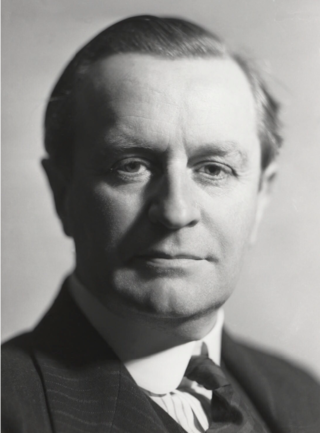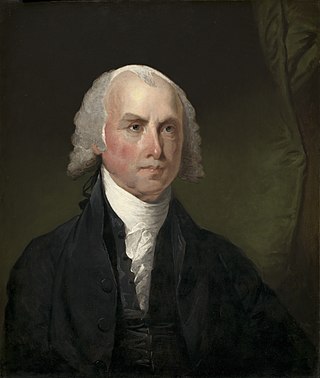
The Federalist Party was a conservative and nationalist American political party and the first political party in the United States. It dominated the national government under Alexander Hamilton from 1789 to 1801. The party was defeated by the Democratic-Republican Party in 1800, and it became a minority party while keeping its stronghold in New England. It made a brief resurgence by opposing the War of 1812, then collapsed with its last presidential candidate in 1816. Remnants lasted for a few years afterwards.
World government is the concept of a single political authority with jurisdiction over all of Earth and humanity. It is conceived in a variety of forms, from tyrannical to democratic, which reflects its wide array of proponents and detractors.

The history of the United States from 1789 to 1815 was marked by the nascent years of the American Republic under the new U.S. Constitution.

The Hartford Convention was a series of meetings from December 15, 1814, to January 5, 1815, in Hartford, Connecticut, United States, in which New England leaders of the Federalist Party met to discuss their grievances concerning the ongoing War of 1812 and the political problems arising from the federal government's increasing power.

James Truslow Adams was an American writer and historian. He was a freelance author who helped to popularize the latest scholarship about American history and his three-volume history of New England is well regarded by scholars. He popularized the phrase "American Dream" in his 1931 book The Epic of America.

Philip Henry Kerr, 11th Marquess of Lothian, was a British politician, British Ambassador to the United States and editor of various journals. He was private secretary to Prime Minister David Lloyd George between 1916 and 1921 and as such played a major role in the Paris Peace Conference (1919–1920). After succeeding a cousin in the marquessate in 1930, he held junior ministerial offices in the Lords from 1931 in the National Government, headed by Ramsay MacDonald, until he resigned from it in 1932.

Clarence Kirschman Streit was an American journalist who played a prominent role in the Atlanticist and world federalist movements.

Altiero Spinelli was an Italian communist politician, political theorist and European federalist, referred to as one of the founding fathers of the European Union. A communist and militant anti-fascist in his youth, Spinelli spent 10 years imprisoned by the Italian fascist regime. Having grown disillusioned with Stalinism, he broke with the Communist Party of Italy in 1937. Interned in Ventotene during World War II, he, along with fellow democratic socialists, drafted the manifesto For a Free and United Europe in 1941, considered a precursor of the European integration process.

Federalist No. 14 is an essay by James Madison titled "Objections to the Proposed Constitution From Extent of Territory Answered". This essay is the fourteenth of The Federalist Papers. It was first published in The New York Packet on November 30, 1787 under the pseudonym Publius, the name under which all The Federalist papers were published. It addresses a major objection of the Anti-Federalists to the proposed United States Constitution: that the sheer size of the United States would make it impossible to govern justly as a single country. Madison touched on this issue in Federalist No. 10 and returns to it in this essay.
Atlantic Union was the most common name for the proposal, originally advanced by journalist Clarence Streit in 1939, to unite the world's leading democratic nations into a federal union, in much the way the thirteen states united in 1789 under the U.S. Constitution.
Grenville Clark was a 20th-century American Wall Street lawyer, co-founder of Root Clark & Bird, member of the Harvard Corporation, co-author of the book World Peace Through World Law, and nominee for the Nobel Peace Prize.

The New World Order is a non-fiction book written by H.G. Wells and published by Secker & Warburg in January 1940. In The New World Order, Wells proposes a framework of international functionalism that could guide the world towards world peace. To achieve that end, Wells asserts that a socialist and scientifically planned world government would be needed to defend human rights.
A Concert of Democracies or League of Democracies is an alternative international organization proposed by Ivo Daalder and James Lindsay in a May 2004 Washington Post op-ed. The concept is broader than a military organization, hence “concert” instead of “alliance.” In a subsequent article in The American Interest, they affirm that roughly 60 countries would qualify for membership under these criteria. They conceive such a "Concert" as a "D-60" group within the UN.

The presidency of John Adams, began on March 4, 1797, when John Adams was inaugurated as the second President of the United States, and ended on March 4, 1801. Adams, who had served as vice president under George Washington, took office as president after winning the 1796 presidential election. The only member of the Federalist Party to ever serve as president, his presidency ended after a single term following his defeat in the 1800 presidential election. He was succeeded by Thomas Jefferson of the opposition Democratic-Republican Party.

This article aims to cover ideas of European unity before 1948.

A federal Europe, also referred to as the United States of Europe (USE), European State, or a European federation, is a hypothetical scenario of European integration leading to the formation of a sovereign superstate, organised as a federation of the member countries of the European Union (EU), as contemplated by political scientists, politicians, geographers, historians, futurologists and fiction writers. At present, while the EU is not officially a federation or even a confederation, most contemporary scholars of federalism view the EU as a federal system.

The Federalist Era in American history ran from 1788 to 1800, a time when the Federalist Party and its predecessors were dominant in American politics. During this period, Federalists generally controlled Congress and enjoyed the support of President George Washington and President John Adams. The era saw the creation of a new, stronger federal government under the United States Constitution, a deepening of support for nationalism, and diminished fears of tyranny by a central government. The era began with the ratification of the United States Constitution and ended with the Democratic-Republican Party's victory in the 1800 elections.

The League to Enforce Peace was a non-state American organization established in 1915 to promote the formation of an international body for world peace. It was formed at Independence Hall in Philadelphia by American citizens concerned by the outbreak of World War I in Europe. Support for the league dissolved and it ceased operations by 1923.

Federalism in the United Kingdom aims at constitutional reform to achieve a federal UK or a British federation, where there is a division of legislative powers between two or more levels of government, so that sovereignty is decentralised between a federal government and autonomous governments in a federal system.
World federalism or global federalism is a political ideology advocating a democratic, federal world government. A world federation would have authority on issues of global reach, while the members of such a federation would retain authority over local and national issues. The overall sovereignty over the world population would largely reside in the federal government.















